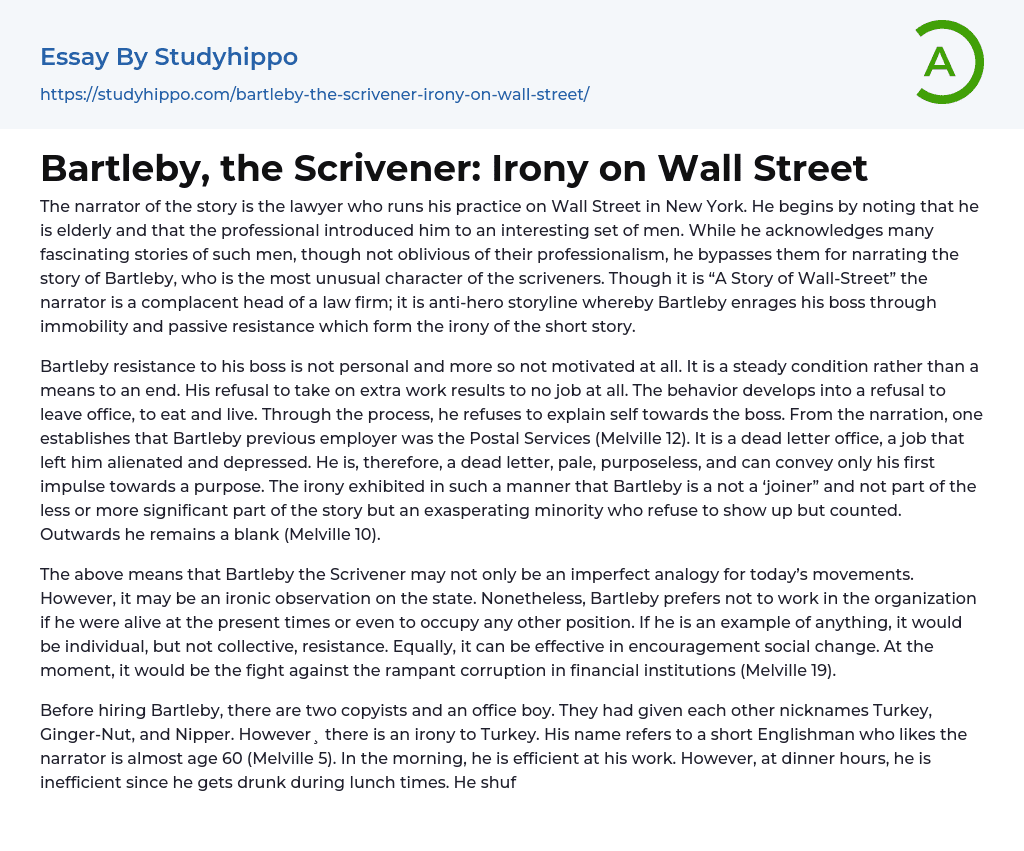The narrator of the story is the lawyer who runs his practice on Wall Street in New York. He begins by noting that he is elderly and that the professional introduced him to an interesting set of men. While he acknowledges many fascinating stories of such men, though not oblivious of their professionalism, he bypasses them for narrating the story of Bartleby, who is the most unusual character of the scriveners. Though it is “A Story of Wall-Street” the narrator is a complacent head of a law firm; it is anti-hero storyline whereby Bartleby enrages his boss through immobility and passive resistance which form the irony of the short story.
Bartleby resistance to his boss is not personal and more so not motivated at all. It is a steady condition rather than a means to an end. Hi
...s refusal to take on extra work results to no job at all. The behavior develops into a refusal to leave office, to eat and live. Through the process, he refuses to explain self towards the boss. From the narration, one establishes that Bartleby previous employer was the Postal Services (Melville 12). It is a dead letter office, a job that left him alienated and depressed. He is, therefore, a dead letter, pale, purposeless, and can convey only his first impulse towards a purpose. The irony exhibited in such a manner that Bartleby is a not a ‘joiner” and not part of the less or more significant part of the story but an exasperating minority who refuse to show up but counted. Outwards he remains a blank (Melville 10).
The above means that Bartleby the Scrivener may not only be
an imperfect analogy for today’s movements. However, it may be an ironic observation on the state. Nonetheless, Bartleby prefers not to work in the organization if he were alive at the present times or even to occupy any other position. If he is an example of anything, it would be individual, but not collective, resistance. Equally, it can be effective in encouragement social change. At the moment, it would be the fight against the rampant corruption in financial institutions (Melville 19).
Before hiring Bartleby, there are two copyists and an office boy. They had given each other nicknames Turkey, Ginger-Nut, and Nipper. However¸ there is an irony to Turkey. His name refers to a short Englishman who likes the narrator is almost age 60 (Melville 5). In the morning, he is efficient at his work. However, at dinner hours, he is inefficient since he gets drunk during lunch times. He shuffles papers, breaks pens, and blots documents. His temper flares and becomes isolated (Melville 3). Since the narrator values Turkeys work during the mornings, he deplores his afternoon work and offer him an off to rest. However, Turkey insists on remaining stating that he is the narrator’s handyman. Unlike, Bartleby, the narrator offer Turkey time off, when not productive but does not do the same with Bartleby, who is inactive at all (Melville 8).
As the narrator concludes, he begins to lose his humility because of the experience with Bartleby. He finds his job as a burden. He realizes that he did not approve forcing the scriveners to copy documents that would protect the guideline of ownership. At first, the Boss encapsulated a general New York City
office manager to indicate how he is a man of virtues and that he bolstered the rules of possession. The behavior implies that he enjoyed controlling others and ensuring everything all together. The aspect engaged him because he enjoyed things the easy way. Therefore, since he fully supported the task, changes he made at the end are the irony of the short story (Melville 20).
Works Cited
- Melville, Herman. Bartleby, the Scrivener. Tustin: Xist Publishing, 2015. Internet resource.
- Melville Herman Bartleby. The Scrivener: Read-aloud eBook with English audio narration. Sinkronigo, 2011
- Analogy essays
- Interpretation essays
- Learning English essays
- Plagiarism essays
- Beef essays
- Beer essays
- Beverages essays
- Bread essays
- Burger essays
- Cake essays
- Coconut essays
- Coffee essays
- Cooking essays
- Crowd essays
- Cuisines essays
- Dairy essays
- Desserts essays
- Dinner essays
- Drink essays
- Fast Food essays
- Favorite Food essays
- Food Safety essays
- Food Security essays
- Food Waste essays
- Fruit essays
- Ginger essays
- Hamburger essays
- Ice Cream essays
- Juice essays
- Lemon essays
- Meal essays
- Meat essays
- Oreo essays
- Organic Food essays
- Pizza essays
- Rice essays
- Sainsbury essays
- Sugar essays
- Taste essays
- Tea essays
- Wine essays
- Adaptation essays
- Adventure essays
- Adversity essays
- Aging essays
- Alcohol essays
- Barbie Doll essays
- Beauty essays
- Care essays
- Carpe diem essays




